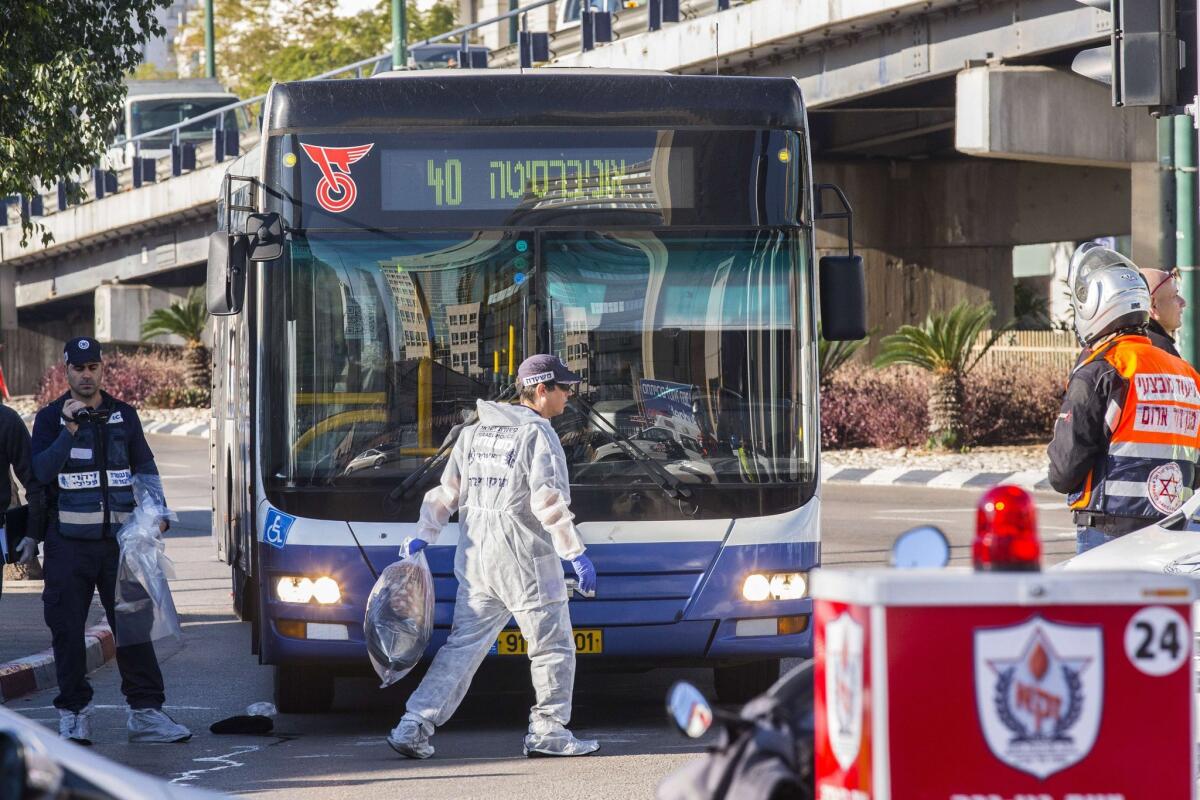Palestinian arrested in stabbing attack on Tel Aviv bus; 13 hurt

- Share via
Reporting from JERUSALEM — A Palestinian man went on a stabbing rampage on a crowded bus at rush hour in Tel Aviv on Wednesday, injuring at least 13 Israelis, some seriously, authorities said.
Police identified the assailant, who was arrested, as 23-year-old Hamza Matrouk from the West Bank city of Tul Karem.
Authorities said he entered Israel illegally Wednesday morning and boarded the bus in Tel Aviv with a knife. Officials said the bus had traveled about 400 yards when Matrouk attacked driver Herzel Biton, stabbing him deeply several times.
Matrouk then stabbed at least 10 passengers before the driver succeeded in opening the bus’ door to allow commuters to escape, leaving trails of blood and personal belongings, police said. One passenger, Liel Suissa, an eighth grader on the way to school, reportedly threw his backpack at Matrouk and scrambled out of a window that broke when he slammed into it as the bus came to a halt.
At least 12 victims were taken to hospitals in and around Tel Aviv after being treated by paramedics for stab wounds, officials said. Several patients were listed in serious condition, among them the bus driver, who was described as fighting for his life. Other passengers and witnesses were treated for anxiety.
“This is a grave terror attack,” Tel Aviv police commander Bentzu Sau told reporters at the scene.
Authorities said the rampage was stopped by members of a special prison service unit who happened to be escorting prisoners to the nearby court when they witnessed the commotion aboard the zigzagging bus and stopped their vehicle.
Matrouk fled on foot and stabbed another woman before two of the prison guards shot him in the leg and handcuffed him, police said.
Matrouk was described as moderately injured and taken for medical treatment and questioning by police and intelligence services. According to police officials, he told interrogators that he was motivated by the recent conflict in Gaza and violent clashes over contested holy sites in Jerusalem. Police reportedly were set to ask a court to extend his detention by 15 days to continue the investigation.
Matrouk reportedly told his interrogators he acted alone, suggesting that the stabbings were a “lone-wolf” attack, a spontaneous act by an individual with few or no accomplices. Experts say such attacks are especially difficult to detect and prevent.
Sau said there had been no specific intelligence warning before the rampage, and Public Security Minister Yitzhak Aharonovitch warned that there might be more loner attacks in the future, urging the public to be vigilant.
The assault broke a period of relative calm in recent weeks, following a rash of deadly attacks in October and November, mostly in Jerusalem. However, the atmosphere remained tense as Israel braced for a backlash to its reported airstrike against Lebanese Hezbollah and Iranian forces in Syria on Sunday.
It also came as Israel and the Palestinians are locked in a bitter clash over the Palestinian appeal to the International Criminal Court in The Hague.
Prime Minister Benjamin Netanyahu cast the stabbing attack in the broadest political context, tying it to recent attacks in Europe.
“The terrorist attack in Tel Aviv is the direct result of the poisonous incitement being disseminated by the Palestinian Authority against the Jews and their state,” he said. “This same terrorism is trying to attack us in Paris, Brussels and everywhere.”
Hamas officials in Gaza and Qatar praised the attack as a “brave, heroic act.” Some Palestinians welcomed the attack on social media with a cartoon depicting a smiling bloodied knife.
Netanyahu blamed Palestinian leader Mahmoud Abbas, noting that he shares a unity government with Hamas and is now seeking war-crimes charges against Israel before the International Criminal Court.
“Abu Mazen is responsible for both the incitement and the dangerous move at the ICC,” said Netanyahu, referring to Abbas by his nickname.
Other hawkish ministers of Netanyahu’s Cabinet also placed the blame on Abbas.
The current situation is particularly sensitive as the deep diplomatic crisis between Israel and the Palestinians plays out in the midst of an Israeli political campaign. Parliamentary elections in March will be a referendum on Netanyahu’s government.
Opposition leader Isaac Herzog, who would like to oust Netanyahu, said the prime minister should “look in the mirror” instead of taking the easy recourse of blaming the Palestinians.
“He has been in power for six years straight. What has he done to change the situation?” he asked in an interview with Israeli media.
Sobelman is a special correspondent.
More to Read
Sign up for Essential California
The most important California stories and recommendations in your inbox every morning.
You may occasionally receive promotional content from the Los Angeles Times.













